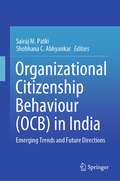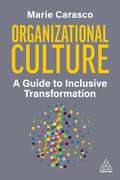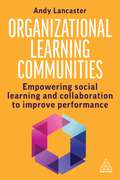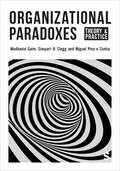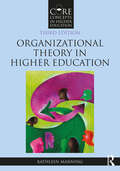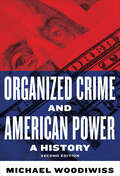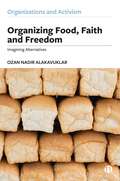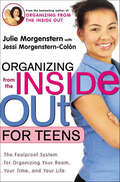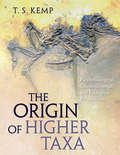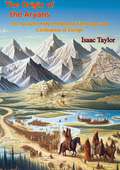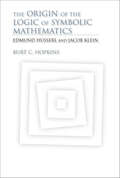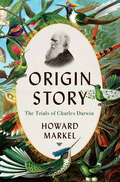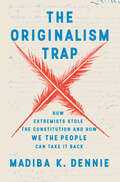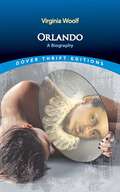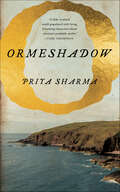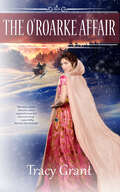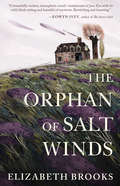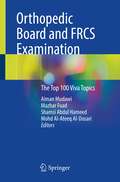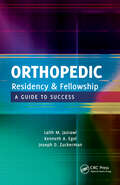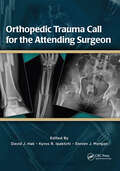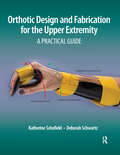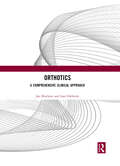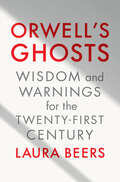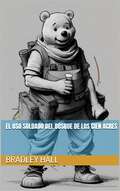- Table View
- List View
Organizational Citizenship Behaviour (OCB) in India: Emerging Trends and Future Directions
by Sairaj M. Patki Shobhana C. AbhyankarThis book presents an exploration of Organizational Citizenship Behaviour (OCB), a concept with a long-standing history. It offers contemporary studies and discusses possible future directions for workplaces. The diverse range of topics this book covers makes it an engaging resource for anyone interested in OCB. The section on the pandemic covers citizenship acts performed by Indian organizations, OCB among teachers, and its significant work-related correlates in post-pandemic India. The second section covers contemporary correlates of OCB, such as work-life balance, compliance, counter-productive workplace behaviours (CWBs), and employee expectations. The future workplaces section discusses challenges to OCB, the measurement of OCB in evolving work environments, the role of machine learning (ML) in recruitment, and the importance of diversity management in ensuring OCB in inclusive workplaces. The book makes a valuable source of relevant issues on OCB while providing a broader perspective on future possibilities. It serves as reference material for students and researchers in fields like organizational behaviour, human resource management and development, and industrial psychology to study contemporary issues in OCB. The book also serves as a handy guide for managers looking to harness the benefits of citizenship behaviours to give their organizations an edge over competitors in the near future.
Organizational Culture: A Guide to Inclusive Transformation
by Marie CarascoDiscover how to transform company culture by embracing the interconnectedness of business and social interests to promote an inclusive workplace.Organizational Culture offers a comprehensive roadmap for transforming company culture. Using a strategic framework for navigating change, this essential guide provides business leaders and change catalysts with a holistic strategy for building a dynamic and inclusive culture. It highlights the importance of leveraging psychological principles, interpersonal dynamics, employee interest-driven initiatives and cooperative leadership to create lasting change. Featuring case studies for practical insight into how to cultivate trust and employee engagement, Organizational Culture highlights how these steps can help align Diversity, Equity, Inclusion and Belonging (DEIB) initiatives to support culture transformation. The resulting resource breaks down the best ways organizations can start engaging in inclusive culture change.
Organizational Learning Communities: Empowering Social Learning and Collaboration to Improve Performance
by Andy LancasterLearning communities transform organizations through sharing knowledge, spearheading practice, solving problems, seeding innovation and supercharging development. So how can you develop a culture of learning in your organization? Organizational Learning Communities answers this question and explains how and why this approach can improve individual employee performance and drive overall business results. Written by a leading voice in the learning profession, this book contains everything that Learning and Development (L&D) practitioners need to know to successfully embed learning communities in their organizations. Following the 7Cs model of Cause, Culture, Conditions, Cadence, Content, Contributions and Credit, the book establishes the key factors that underpin thriving learning communities as well as the benefits of social and collaborative learning in the company. This practical guide establishes strategies to drive community impact and report success to stakeholders, drawing widely on evidence-based research and real-world examples. Each chapter ends with reflective questions to support transfer to the reader's context. This is essential reading for those involved in facilitating learning communities, or planning on pioneering one, to empower their organization's productivity and performance.
Organizational Paradoxes: Theory and Practice (Research In The Sociology Of Organizations Ser. #73, Part B)
by Stewart R Clegg Medhanie Gaim Miguel Pina e CunhaThis captivating book delves into the complex realm of management and organizational dynamics, focusing on the significance of paradoxes. From the intricate interplay between social obligations and business missions to the tension between stability and change, this textbook unveils the essence of these enduring contradictions. As organizations evolve, paradoxes become defining features, and illustrative cases of this are included throughout the textbook. Organizational Paradoxes equips students of organization management, organization change and strategy with an understanding of paradoxes, their philosophical underpinnings and their management in practice. Medhanie Gaim (PhD) is Associate Professor of Management at Umeå School of Business, Economics, and Statistics, Sweden. Stewart Clegg is Professor at the University of Sydney in the School of Project Management and the John Grill Institute for Project Leadership and a Distinguished Emeritus Professor of the University of Technology Sydney. Miguel Pina e Cunha is the Fundação Amélia de Mello chair professor at Nova School of Business and Economics, Nova University Lisbon, Portugal.
Organizational Paradoxes: Theory and Practice (Research In The Sociology Of Organizations Ser. #73, Part B)
by Stewart R Clegg Medhanie Gaim Miguel Pina e CunhaThis captivating book delves into the complex realm of management and organizational dynamics, focusing on the significance of paradoxes. From the intricate interplay between social obligations and business missions to the tension between stability and change, this textbook unveils the essence of these enduring contradictions. As organizations evolve, paradoxes become defining features, and illustrative cases of this are included throughout the textbook. Organizational Paradoxes equips students of organization management, organization change and strategy with an understanding of paradoxes, their philosophical underpinnings and their management in practice. Medhanie Gaim (PhD) is Associate Professor of Management at Umeå School of Business, Economics, and Statistics, Sweden. Stewart Clegg is Professor at the University of Sydney in the School of Project Management and the John Grill Institute for Project Leadership and a Distinguished Emeritus Professor of the University of Technology Sydney. Miguel Pina e Cunha is the Fundação Amélia de Mello chair professor at Nova School of Business and Economics, Nova University Lisbon, Portugal.
Organizational Theory in Higher Education (Core Concepts in Higher Education)
by Kathleen ManningThe third edition of Organizational Theory in Higher Education is a comprehensive and accessible treatment of organizational theory and higher education administration. Through her presentation of both traditional and contemporary organizational theories, noted scholar Kathleen Manning offers a multi-faceted take on the models and lenses through which higher education can be viewed.Chapters discuss the disciplinary foundation, uses, constructs, and assumptions of each organizational theory, including theories often excluded from the literature like organized anarchy, feminist, loosely coupled systems, and queer theory. Each chapter concludes with a case study and discussion questions that encourage the reader to make connections to their practice. Combining theory and practice, Manning’s rich, interdisciplinary treatment enables leaders to gain a fuller understanding of the perspectives that operate on college campuses and ways to enact inclusive, ethical change in the context of new and continuing challenges.New to this Edition: A new chapter on Queer Theory that presents more socially just approaches to institutional organization A new chapter on Loosely Coupled Systems presenting the application of this theory to higher education settings Revised chapters, updated theory, and new coverage that reflect current issues, such as pandemic, crisis responses, and social media Several new and revised case studies to address contemporary issues and align with current realities of higher education Updated and enhanced discussion questions to continue the conversation
Organized Crime and American Power: A History, Second Edition
by Michael WoodiwissPopular histories of organized crime in the United States often look to the Mafia and the sons of early twentieth-century immigrants – such as Al Capone, Lucky Luciano, and Meyer Lansky – for their origins. In this second edition of Organized Crime and American Power, Michael Woodiwiss refocuses on US organized crime as an American problem. The book starts in 1789, with the birth of a new nation, intended to be run according to laws and conventions, with a written commitment to civil rights. Woodiwiss examines the organization of crime before the Civil War, which damaged or destroyed the lives of those excluded from constitutional protections: Indigenous peoples, Black people, and women. The book focuses on white supremacist crime and the pernicious influence of Southern leaders in alliance with opportunistic politicians. It examines the organized crimes of powerful business interests in alliance with politicians, as well as the corrupt consequences of the US moralistic campaigns against alcohol, gambling, drugs, and abortion. Organized Crime and American Power brings solid historical evidence and analysis to the task of refuting conventional wisdom that frames organized crime as something external to US political, economic, and social systems.
Organizing Food, Faith and Freedom: Imagining Alternatives (Organizations and Activism)
by Ozan Nadir AlakavuklarConsumerism, unsustainable growth, waste and inequalities continue to ail societies across the globe, but creative collectives have been tackling these issues at a grassroots level. Based on an autoethnographic study about a free food store in Aotearoa New Zealand, this book presents a first-hand account of how a community is organized around surplus food to deal with food poverty, while also helping the reader to see through the complexity that brings the free food store to life. Examining how alternative economies and relations emerge from these community solutions, the author shows it is possible to think, act and organize differently within and beyond capitalist dynamics.
Organizing from the Inside Out for Teens: The Foolproof System for Organizing Your Room, Your Time, and Your Life
by Julie Morgenstern Jessi Morgenstern-ColónFrom Organizing from the Inside Out for Teens:Jessi Says What's My Payoff?My bedroom is my home base and keeping it organized is a must. If my room isn't in solid condition, it's difficult to keep the rest of my life on track. Here are some other reasons that motivate me to keep my room organized:- My room is the only space on the entire planet that is solely mine.- My organized room allows me to maximize my space and time.- My room boosts my confidence.- My room gives others (especially my mom!) confidence in me.- Organizing my room allows me to do what I want, when I want.
The Origin of Higher Taxa: Palaeobiological, Developmental, and Ecological Perspectives
by T.S. KempIn the grand sweep of evolution, the origin of radically new kinds of organisms in the fossil record is the result of a relatively simple process: natural selection marching through the ages. Or is it? Does Darwinian evolution acting over a sufficiently long period of time really offer a complete explanation, or are unusual genetic events and particular environmental and ecological circumstances also involved? With The Origin of Higher Taxa, Tom Kemp sifts through the layers of paleobiological, genetic, and ecological evidence on a quest to answer this essential, game-changing question of biology. Looking beyond the microevolutionary force of Darwinian natural selection, Kemp enters the realm of macroevolution, or evolution above the species level. From the origin of mammals to the radiation of flowering plants, these large-scale patterns—such as the rise of novel organismal design, adaptive radiations, and lineage extinctions—encompass the most significant trends and transformations in evolution. As macroevolution cannot be studied by direct observation and experiment, scientists have to rely on the outcome of evolution as evidence for the processes at work, in the form of patterns of species appearances and extinctions in a spotty fossil record, and through the nature of species extant today. Marshalling a wealth of new fossil and molecular evidence and increasingly sophisticated techniques for their study, Kemp here offers a timely and original reinterpretation of how higher taxa such as arthropods, mollusks, mammals, birds, and whales evolved—a bold new take on the history of life.
The Origin of the Aryans. An Account of the Prehistoric Ethnology and Civilisation of Europe
by Isaac TaylorEmbark on an enlightening exploration of ancient Europe with Isaac Taylor's The Origin of the Aryans: An Account of the Prehistoric Ethnology and Civilization of Europe. This seminal work offers a comprehensive and scholarly examination of the origins, migrations, and cultural development of the Aryan peoples, whose influence has profoundly shaped the history and civilization of Europe.Taylor, a distinguished philologist and ethnologist, meticulously pieces together the puzzle of Aryan prehistory through a synthesis of linguistic, archaeological, and anthropological evidence. His rigorous analysis traces the roots of the Aryan peoples, delving into their early habitats, societal structures, and the extensive migrations that spread their language and cultural practices across the European continent.The Origin of the Aryans provides readers with an in-depth understanding of the various theories and debates surrounding Aryan origins. Taylor critically examines the evidence for the Proto-Indo-European homeland, offering insights into the linguistic connections and cultural exchanges that link the diverse Aryan-descended populations.In addition to tracing the migratory paths and settlements of the Aryans, Taylor explores their contributions to the prehistoric civilization of Europe. He sheds light on the advancements in agriculture, metallurgy, social organization, and religious practices that the Aryans introduced, which laid the foundations for later European societies.The Origin of the Aryans invites readers to delve into the distant past and discover the intricate web of influences that shaped the prehistoric ethnology and civilization of Europe. Isaac Taylor's work remains a cornerstone in the study of ancient European history and the enduring legacy of the Aryan peoples.
The Origin of the Logic of Symbolic Mathematics: Edmund Husserl and Jacob Klein (Studies in Continental Thought)
by Burt C. HopkinsBurt C. Hopkins presents the first in-depth study of the work of Edmund Husserl and Jacob Klein on the philosophical foundations of the logic of modern symbolic mathematics. Accounts of the philosophical origins of formalized concepts—especially mathematical concepts and the process of mathematical abstraction that generates them—have been paramount to the development of phenomenology. Both Husserl and Klein independently concluded that it is impossible to separate the historical origin of the thought that generates the basic concepts of mathematics from their philosophical meanings. Hopkins explores how Husserl and Klein arrived at their conclusion and its philosophical implications for the modern project of formalizing all knowledge.
Origin Story: The Trials of Charles Darwin
by Howard MarkelA lively account of how Darwin’s work on natural selection transformed science and society, and an investigation into the mysterious illness that plagued its author. By early morning of June 30, 1860, a large crowd began to congregate in front of Oxford University’s brand-new Museum of Natural History. The occasion was the annual meeting of the British Association for the Advancement of Science, and the subject of discussion was Charles Darwin’s new treatise: fact or fiction? Darwin, a simultaneously reclusive and intellectually audacious squire from Kent, claimed to have solved “that mystery of mysteries,” introducing a logical explanation of the origin of species—how they adapted, even transmogrified, through natural selection. At stake, on that summer’s day of spirited debate, was the very foundation of modern biology, not to mention the future of the church. Without fear of exaggeration, Darwin’s thesis would forever change our understanding of the life sciences and the natural world. And yet the author himself was nowhere to be found in the debate hall—instead, he was miles away, seeking respite from a spate of illnesses that had plagued him for much of his adult life. In Origin Story, medical historian Howard Markel recounts the two-year period (1858 to 1860) of Darwin’s writing of On the Origin of Species through its spectacular success and controversy. Simultaneously, Markel delves into the mysterious health symptoms Darwin developed, combing the literature to emerge with a cogent diagnosis of a case that has long fascinated medical historians. The result is a colorful portrait of the man, his friends and enemies, and his seminal work, which resonates to this day.
The Originalism Trap: How Extremists Stole the Constitution and How We the People Can Take It Back
by Madiba K. DennieA rallying cry for a more just approach to the law that bolsters social justice movements by throwing out originalism—the theory that judges should interpret the Constitution exactly as conservatives say the Founders meant it&“The greatest trick conservatives ever pulled was convincing the world that originalism exists. This book is vital for understanding why the world sucks right now.&”—Elie Mystal, author of Allow Me to RetortThere is no one true way to interpret the Constitution, but that&’s not what originalists want you to think. They&’d rather we be held hostage to their &“objective&” theory that our rights and liberties are bound by history—an idea that was once confined to the fringes of academia. Americans saw just how subjective originalism can be when the Supreme Court cherry-picked the past to deny bodily autonomy to millions of Americans in Dobbs v. Jackson Women&’s Health. Though originalism is supposed to be a serious intellectual theory, a closer look reveals its many inherent faults, as it deliberately over-emphasizes a version of history that treats civil rights gains as categorically suspect. According to Madiba K. Dennie, it&’s time to let it go.Dennie discards originalism in favor of a new approach that serves everyone: inclusive constitutionalism. She disentangles the Constitution&’s ideals from originalist ideology and underscores the ambition of the Reconstruction Amendments, which were adopted in the wake of the Civil War and sought to build a democracy with equal membership for marginalized persons. The Originalism Trap argues that the law must serve to make that promise of democracy real.Seamlessly blending scholarship with sass and written for law people and laypeople alike, The Originalism Trap shows readers that the Constitution belongs to them and how, by understanding its possibilities, they can use it to fight for their rights. As courts—and the Constitution—increasingly become political battlegrounds, The Originalism Trap is a necessary guide to what&’s at stake and a vision for a more just future.
Orlando: A Biography (Dover Thrift Editions: Classic Novels)
by Virginia WoolfVirginia Woolf’s satirical, prescient novel Orlando, published in 1928, is a groundbreaking work that explores themes of gender, identity, and time. The narrative features a nobleman named Orlando who lives over three centuries, beginning in the Elizabethan era and ending in the twentieth century, and, remarkably, changes from man to woman at the midpoint. With its fusion of masculinity and femininity, this transformation allows Woolf to critique societal norms and expectations tied to gender and class in different periods. Through Orlando’s unique life span and gender fluidity, Woolf suggests that gender is not fixed or binary, challenging the traditional concepts of gender roles and stereotypes. A complex and multilayered novel that defies easy categorization, Orlando is lauded for its rich prose and its pioneering representation of gender and queer identity. It is a work of literature that continues to resonate with readers today.
Ormeshadow
by Priya SharmaWinner of the 2019 Shirley Jackson Novella AwardWinner of the 2020 BFS AwardAcclaimed author Priya Sharma transports readers back in time with Ormeshadow, a coming-of-age story as dark and rich as good soil.Burning with resentment and intrigue, this fantastical family drama invites readers to dig up the secrets of the Belman family, and wonder whether myths and legends are real enough to answer for a history of sin.Uprooted from Bath by his father's failures, Gideon Belman finds himself stranded on Ormeshadow farm, an ancient place of chalk and ash and shadow. The land crests the Orme, a buried, sleeping dragon that dreams resentment, jealousy, estrangement, death. Or so the folklore says. Growing up in a house that hates him, Gideon finds his only comforts in the land. Gideon will live or die by the Orme, as all his family has.At the Publisher's request, this title is being sold without Digital Rights Management Software (DRM) applied.
The O’Roarke Affair (The Rannoch Fraser Mysteries #29)
by Tracy GrantIn dazzling Regency London, married spies Malcolm and Mélanie Rannoch find their most challenging investigation may be uncovering the secrets of the cunning spymaster who shaped both their destinies.Spymaster. Revolutionary. Master of disguise. Raoul O’Roarke remains an enigma even to those closest to him. By the age of three, Malcolm Rannoch knew enough of Raoul's life that he wondered if every goodbye would be their last. Thirty years later, Malcolm, now a spy himself, understands a great deal more, but in many ways Raoul is still a mystery. Malcolm’s wife and fellow agent Mélanie has her own complicated relationship with Raoul, who was once her spymaster.When a contact at a dockside tavern warns the Rannochs that powerful forces want Raoul dead, Malcolm and Mélanie are shaken to the core. They’ve barely had time to absorb the revelation when a nearby ship explodes. Rushing to help fight the ensuing fire, the Rannochs find the body of the powerful Duke of Bamford amid the charred wreckage.Bamford, a Tory diplomat and Raoul, a revolutionary, knew each other far better than anyone realized. Their unlikely alliance leads from the French Revolution through Napoleon and Josephine’s glamorous court to the glittering Congress of Vienna, and the horrors of Waterloo. The clues from their past hold the key to Bamford’s murder. As Malcolm and Mélanie connect the pieces, they find as many questions as answers. Raoul has even more secrets than either of them guessed—secrets they need to uncover to prevent his meeting the same fate as the duke. But the process may shake their relationships with him to the core. And their next goodbye could be their final parting.
The Orphan of Salt Winds
by Elizabeth BrooksFor fans of Eowyn Ivey, Rose Tremaine, and Kate Atkinson, The Orphan of Salt Winds is a bewitching debut about the secrets that haunt us. England, 1939. Ten-year-old Virginia Wrathmell arrives at Salt Winds, a secluded house on the edge of a marsh, to meet her adoptive parents—practical, dependable Clem and glamorous, mercurial Lorna. The marsh, with its deceptive tides, is a beautiful but threatening place. Virginia’s new parents’ marriage is full of secrets and tensions she doesn’t quite understand, and their wealthy neighbor, Max Deering, drops by too often, taking an unwholesome interest in the family’s affairs. Only Clem offers a true sense of home. War feels far away among the birds and shifting sands—until the day a German fighter plane crashes into the marsh, and Clem ventures out to rescue the airman. What happens next sets into motion a crime so devastating it will haunt Virginia for the rest of her life. Seventy-five years later, she finds herself drawn back to the marsh, and to a teenage girl who appears there, nearly frozen and burdened by her own secrets. In her, Virginia might have a chance at retribution and a way to right a grave mistake she made as a child. Elizabeth Brooks’s gripping debut mirrors its marshy landscape—full of twists and turns and moored in a tangle of family secrets. A gothic, psychological mystery and atmospheric coming-of-age story, The Orphan of Salt Winds is the portrait of a woman haunted by the place she calls home.
Orthopedic Board and FRCS Examination: The Top 100 Viva Topics
by Aiman Mudawi Mazhar Fuad Shamsi Abdul Hameed Mohd Al-Ateeq Al-DosariThis book focuses on the precise needs of candidates preparing for the viva part of the FRCS, Int-FRCS, and Orthopaedic Board Examinations. With more than 600 candidates annually sitting for these examinations this volume is meticulously crafted to empower aspiring orthopaedists to excel in it.Structured for effortless comprehension, the book is presented in a reader-friendly format that facilitates effective revision. Entirely written by experts who have successfully navigated these examinations its authorship contributes to make it an invaluable resource for aspirant orthopaedists.This practical yet comprehensive book covers high-yield topics essential for passing the exams while also equipping readers with strategies to confidently address even the most unconventional scenarios they may encounter during vivas. This practical resource provides a structured and unparalleled approach to empower aspiring orthopaedists to excel in the FRCS, Int-FRCS, and Orthopaedic Board Examinations.
Orthopedic Residency and Fellowship: A Guide to Success
by Kenneth Egol Joseph Zuckerman Laith JazrawiOrthopedic surgery remains one of the most competitive subspecialties in medicine. This “how- to” guide describes how medical students can achieve their goal of being accepted into an orthopedic residency program and how to thrive once there.What will you learn from Orthopedic Residency and Fellowship: A Guide to Success?• How medical students can achieve their goal of being accepted into an orthopedic residency program• How to succeed during and after your residency• Tips and pearls to maximize your experience• Budgeting your time• Peer interaction• Job placement• How to read a contract• How to decide between academic or private practice• Asset protection • Making the right financial decisionOrthopedic Residency and Fellowship: A Guide to Success by Drs. Laith M. Jazrawi, Kenneth A. Egol and Joseph D. Zuckerman is the only book on the market that solely focuses on getting into an orthopedic residency or fellowship training program, excelling once you are there, and maximizing and obtaining the right practice opportunity for you. Providing easy-to-read chapters and quick reference materials, this book is a must-read for anyone interested in the field of musculoskeletal care.
Orthopedic Trauma Call for the Attending Surgeon
by Steven Morgan David Hak Kyros IpaktchiOrthopedic Trauma Call for the Attending Surgeon is a clinically focused book that will help guide the orthopedic surgeon through the most commonly encountered injuries when on call.Drs. David J. Hak, Kyros R. Ipaktchi and Steven Morgan are joined by over 50 leading experts to provide a succinct and quick review of the key points that will allow you to provide patients with expert and immediate care.Inside Orthopedic Trauma Call for the Attending Surgeon each chapter is written in an easy to read bulleted format that will allow for a quick review of the key facts you need to know while taking call. Chapters also cover emergent and definitive management and provide guidelines for when to consider referral to a higher level of care. The authors also share their tips and tricks for successful outcomes, while highlighting potential pitfalls and how to avoid them. Since it can be difficult to find time to read a traditional textbook or review article, Orthopedic Trauma Call for the Attending Surgeon is perfect for orthopedic surgeons, physician assistants, extenders who cover ER call, and orthopedic trainees.
Orthotic Design and Fabrication for the Upper Extremity: A Practical Guide
by Katherine Schofield Deborah SchwartzOrthotic Design and Fabrication for the Upper Extremity: A Practical Guide by Drs. Katherine Schofield and Deborah Schwartz is a unique guide that illustrates orthotic design and fabrication in a clear step-by-step fashion by presenting printed textual material along with instructional videos. The first chapters lay the foundation for orthotic design and detail the anatomical knowledge and background information that is required before molding orthoses on clients. Each chapter explores a specific part of the upper extremity, describes several common clinical diagnoses, and highlights typical orthoses that might be utilized to immobilize and protect it. Together, these chapters communicate core, foundational knowledge for the use of orthoses as an intervention in occupational therapy practice. The instructional videos also emphasize the application of biomechanical, anatomic, and clinical constructs in orthotic design, fabrication, and evaluation. The textbook and video content work together enabling students and entry-level practitioners to learn with visual and versatile resources. University faculty members will gain access to ample activities and exercises to augment their classroom and laboratory teaching. This allows for more efficient use of time and appeals to the learning styles of current and future students. This text includes: Chapters devoted to specific type of orthosis for parts of the upper extremity linked to step -by -step instructional videos Case studies to promote a grasp of the knowledge and application to the development of clinical reasoning skills Multiple choice and short answer review questions and activities for most chapters Presentation of current evidence to support the use of the specific orthoses in clinical practice Patterns that can be replicated and check out sheets to critique each orthosis The combination of text materials and instructional video material makes Orthotic Design and Fabrication for the Upper Extremity: A Practical Guide a uniquely valuable resource for occupational therapy students, new graduates, and novice clinicians.
Orthotics: A Comprehensive Clinical Approach
by Joan Edelstein Jan BrucknerOrthotics: A Comprehensive Clinical Approach is an innovative and comprehensive new text that provides essential information about contemporary orthoses to guide the student and clinician in prescribing and utilizing these appliances in neuromuscular, musculoskeletal, and integumentary rehabilitation.Written by recognized authorities in the field, Joan Edelstein, MA, PT, FISPO and Jan Bruckner, PhD, PT, this is a prime resource for practitioners and clinicians.Individual chapters cover orthoses for the foot, ankle, knee, hip, trunk, neck, shoulder, elbow, wrist, and hand. Orthoses for patients with paraplegia, burns, and soft tissue contractures are detailed and illustrated. Prescription guidelines, evaluation techniques, goal setting, and training procedures are presented. Each chapter has interesting thought questions and case studies to promote clinical reasoning and problem-solving skills. A unique feature of this text is the inclusion of a point-counterpoint discussion to demonstrate how clinicians can manage the same patient in different ways. This approach inspires broader thinking about clinical management.
Orwell's Ghosts: Wisdom and Warnings for the Twenty-First Century
by Laura BeersFor the 75th anniversary of 1984, Laura Beers explores George Orwell’s still-radical ideas and why they are critical today. George Orwell dedicated his career to exposing social injustice and political duplicity, urging his readers to face hard truths about Western society and politics. Now, the uncanny parallels between the interwar era and our own—rising inequality, censorship, and challenges to traditional social hierarchies—make his writing even more of the moment. Invocations of Orwell and his classic dystopian novel 1984 have reached new heights, with both sides of the political spectrum embracing the rhetoric of Orwellianism. In Orwell’s Ghosts, historian Laura Beers considers Orwell’s full body of work—his six novels, three nonfiction works, and brilliant essays on politics, language, and the class system—to examine what “Orwellian” truly means and reveal the misconstrued thinker in all his complexity. She explores how Orwell’s writing on free speech addresses the proliferation of “fake news” and the emergence of cancel culture, highlights his vivid critiques of capitalism and the oppressive nature of the British Empire, and, in contrast, analyzes his failure to understand feminism. Timely, wide-ranging, and thought-provoking, Orwell’s Ghosts investigates how the writings of a lionized champion of truth and freedom can help us face the crises of modernity.
El oso soldado del Bosque de los Cien Acres
by Bradley HallUn libro basado en Winnie Pooh, de A. A. Milne y en la historia de Wojtek, el oso soldado polaco. Sumérgete en el increíble viaje de Winnie Pooh mientras cuenta su vida como Wojtek, el oso soldado. Esta historia conmovedora entrelaza la memorable vida de Wojtek, un soldado en el ejército polaco durante la Segunda Guerra Mundial y su transformación en el entrañable Winnie Pooh que conocemos y amamos. A través de una narración cautivadora e imágenes vívidas, los lectores serán transportados al Bosque de los Cien Acres y a los campos de batalla, en donde descubrirán el poder de la amistad, de la resiliencia y de la esperanza. Una lectura imprescindible tanto para los fans de Winnie Pooh como para los entusiastas de la historia. Este encantador relato te dejará inspirado y te cambiará para siempre.
